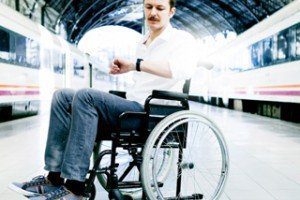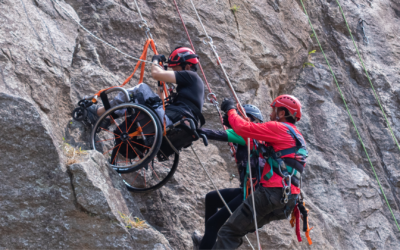
Travel tools for disabled travellers
Innovative apps, while upsetting the status quo in the traditional travel industry landscape, are opening up possibilities in business travel, from car-sharing to accommodation to communication platforms. Yet is this new wave impacting those travellers with special needs when it comes to booking?
In the leisure sector, numerous dedicated agencies cater for disabled travellers, in part due to their focus on elderly holidaymakers. When it comes to corporate travel, travel management companies (TMCs) are aware of the Equality Act 2010, which states it is against the law for employers to treat an individual less favourably than someone else because of a personal characteristic, including being disabled.
As a result, TMCs must ensure training is in place to cater for any special assistance requests. This can include catering for a range of factors: employees with hearing and visual impairments, pregnant travellers, or staff with broken limbs. There’s also the provision for the use of medical equipment or medication on flights.
The United Nations World Tourism Organisation (UNWTO) celebrated the theme of ‘tourism for all – promoting universal accessibility’ on World Tourism Day in September, where secretary general Taleb Rifai said: “Accessibility for all should be at the centre of tourism policies and business strategies, not only as a human right, but also as a great market opportunity.”
A HELPING HAND
In the UK, the Department for Work and Pensions says nearly seven million people of working age in the UK are disabled or have a health condition, including 80,000 registered blind and partially sighted people. In the leisure sector, specialist agents say they give travellers a ‘personal service’.
One emerging area is the power of the crowd – user-generated content and online forums. Nigel Marriott, founder of Marriott Statistical Consulting, is partially blind and travels in the UK via train, occasionally flying.
“The main thing is good in-room lighting, which most hotels don’t offer. Most rooms are dimly lit, with dark corridors,” he says. “And it’s not always about the inside of the hotel, but access to the hotel. For example, is there busy traffic, are there roads to cross, is it rural? There are 101 items around merely getting to the hotel.”
Marriott prefers to book direct, but says websites that offer customer reviews, such as Hotels.com, can be a useful source of information, while Facebook forums are increasingly useful to research the best hotels. “With hotels, you’re still relying on people having stayed in them,” says Marriott, “and if the group is too broad it can be a problem – but if you know a cluster of people similar to yourself you can put in the questions and get a response”.
SPECIAL ASSISTANCE NEEDS
TMCs tasked with group travel are also more than aware of the issue. Key Travel, for example, deals with 1,000 group travel bookings a year, half of which are for its NGO clients and the other half for university clients. “If you’re taking, say, a 30-person group to Egypt, it’s likely one of those travellers will have special assistance needs,” says group marketing director John O’Sullivan.
While there is no specific technology in particular that aids special assistance bookings, O’Sullivan believes that the quality of TMCs’ data management is key. “Where TMCs can get this right is the robustness of data,” he says.
Key Travel has training in place for consultants on accessible travel. “It’s down to people – those booking with us have a travel profile generated,” says O’Sullivan. “It’s about storage of details, marking it on the itinerary. However, sometimes an administrator will book the travel, so you’re once-removed. Technology can help you, but you can’t rely on it.”
Yet there is one start-up aiming to merge both standardisation and reliability. Accomable was co-founded last summer by Srin Madipalli, who has spinal muscular atrophy. It is a global platform that provides specialised information and listings on assisted travel and adapted accommodation for disabled and elderly people.
“A couple of years ago I took six months off work from my law job to go travelling, and it is one of the best things I have ever done,” he says. “I am disabled but was still able to go scuba diving in Bali, wheelchair trekking in California, and even learnt how to fly a plane. But planning a trip with a wheelchair was incredibly difficult at times – I’d arrive at accommodation that was advertised as accessible only to find it wasn’t, and I’d have to research hire cars that were specially adapted to fit my wheelchair at each new location.
“I left my job as a lawyer in London, and did an MBA at Oxford. I quickly became interested in tech and how transformative it could be. Companies like Airbnb and Uber were not only changing the business landscape but they were transforming the way people travelled, too. Yet time and again accessibility was often overlooked.”
WORKING TOGETHER
Accomable raised private funding earlier this year and now wants to start working with TMCs. In the summer it signed deals with Carlson Rezidor and IHG, and now offers more than 600 accessible properties in 60 countries, with plans to grow this to 1,500 properties by the end of the year.
Madipalli agrees there is a rise in the use of social media for disabled travellers, and uses Facebook and Twitter to find property recommendations from users.
“Seeking advice from others in a similar position has a lot of value,” he says. “It’s one of the reasons we have our travel club on Facebook. There is also a forum on Accomable for disabled travellers to ask for tips on accessible travel.”
The move into hotels is welcomed by Key Travel’s O’Sullivan, who argues standards are not always the same for hotel chains. “Airlines are generally really good at supporting people with disabilities; hotels less so,” he says.
Official standards do exist, and guidelines are produced that promote universal accessibility in tourism. However, new entrants such as Accomable may be able to usher in a new wave of apps that can leverage relationships with major travel and tourism enterprises, making a practical difference to those travellers with special assistance needs.
Source: Buying Business Travel
Compartilhe
Use os ícones flutuantes na borda lateral esquerda desta página
Siga-nos!
Envolva-se em nosso conteúdo, seus comentários são bem-vindos!
Artigos relacionados
Teleton AACD. A pessoa com deficiência como protagonista.
Teleton AACD. A pessoa com deficiência como protagonista. Uma iniciativa internacional abraçada pelo SBT no Brasil.
Acessibilidade no ESG. Equipotel aborda o tema para o turismo.
Acessibilidade no ESG, para o mercado do turismo. Equipotel aborda a importância da inclusão da pessoa com deficiência.
Morte Sobre Rodas. Filme inclusivo foi candidato ao Oscar.
Morte Sobre Rodas. Dois protagonistas do filme, são pessoas com deficiência, um usuário de cadeira de rodas e outro com paralisia cerebral.






0 comentários